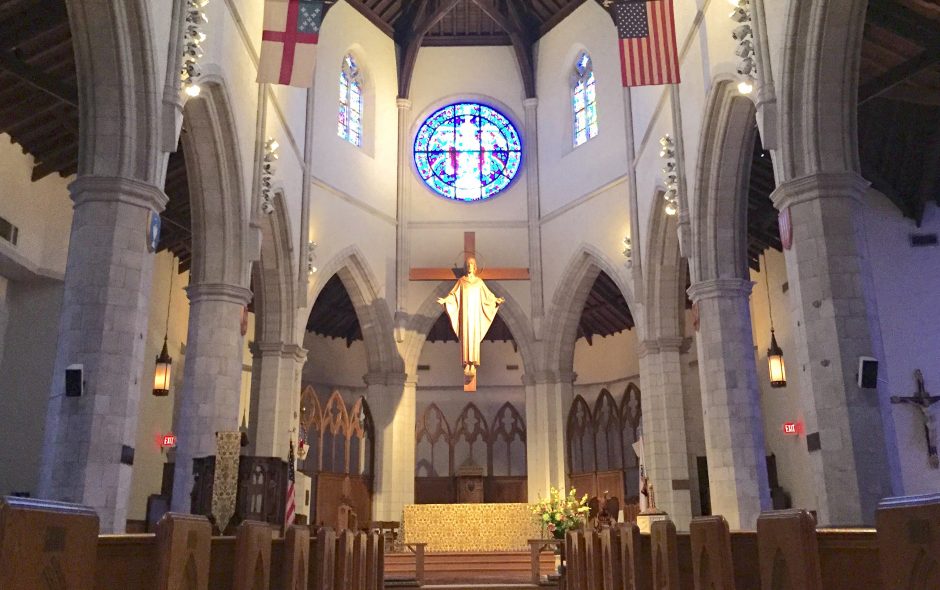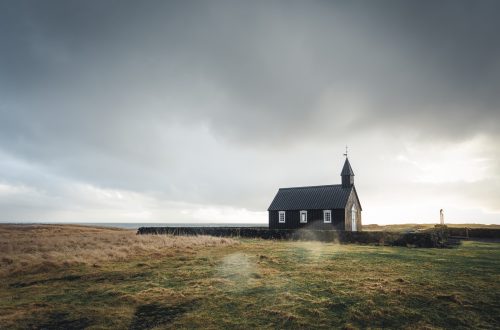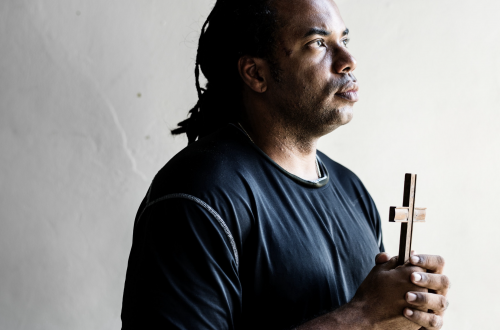Within the last two months as many of my closest friends have died, Joel Strack and Ben Lane. The former’s passing came with the gift of a month of hospice care which afforded his friends the opportunity to reminisce about days long gone, when we had more hair, less excess weight, and our futures seemed boundless. It also granted his family time to see firsthand their beloved’s impact on Central Florida. With the latter’s passing, we were not so fortunate. My friend was called home with no warning at all. There was only a simple, Ben’s suffered a heart attack can you come to the hospital? Quick. Death came stealthily on the remnant breezes of Hurricane Dorian’s drive-by approach some one hundred miles off the Florida coast. And while the winds wrought no notable damage to Orlando structures, the hearts of everyone who knew and loved Benjamin Thomas Lane were left shattered.
First movement, Andante
Sunday, September 22, the Cathedral Church of Saint Luke was the site of a requiem eucharist for one of our own, Canon Musician Ben Lane. For those not conversant with the peculiar terms for everything we hold dear in The Episcopal Church from hats (miters) to hallways (ambulatories), let me explain. The term eucharist comes from the Greek word for “thanksgiving,” and is the sacrament of Christ’s body and blood, also known as the Lord’s Supper and Holy Communion. A requiem is a special eucharist offered on behalf of the deceased with prayers you’d find read at a funeral. The title originates from the first words for this rite in Latin, requiem aeternam dona eis, Domine (“Give them eternal rest, O Lord”). In short, the event was the equivalent of a state funeral presided over by our bishop and diocesan officials; an appropriate homegoing honor given the breadth, depth, and impact of Ben’s ministry of music and love of people.
In 2004, I moved back to Orlando and searched for a new church home, after a nine-year stint in Los Angeles. The Episcopal church I attended in Pasadena, All Saints Church, offered a lot that I liked, including the rector (priest in charge) Ed Bacon who marched with Martin Luther King, Jr. and was passionate about the church’s involvement in social causes. I figured I’d start with Orlando’s Cathedral of Saint Luke and work my way through the parishes in town, visiting each one for two consecutive Sundays until I found the one where I felt most at home. I was committed to my search, fully aware that finding the right congregation would take a considerable amount of time.
Simple enough, right?
The hitch in all of this: me. I’m shy. Painfully so. Despite how my stories may read or whatever imagined impressions you think you’ve gleaned from my writings, I’d much rather meet people — even family members — in small intimate settings. It’s who I am. I own it. I’ve been this way for as long as I can remember. To this day, if given the option, I’ll choose one-on-one interactions four out of five times over large gatherings. Then there’s the fact I’d sell anyone’s mother up the river for the ability to enter and exit a room totally unnoticed, but living my best life as forty-eight-inch tall Black man precludes any chance of that ever happening. (Just kidding. I would not sell my own mother up the river.)
One Sunday morning during Eastertide 2007, I ambled into the Cathedral. The physical space bowled me over. How could anyone not fall in love with its Neo-Gothic architecture? I chose an out of the way pew and took in the surroundings. Church architecture, traditional hymns, and sacred music have always appealed to me, but there are three other features I look for when church shopping: sound Biblical teaching, good music, and lively fellowship. The liturgy (order of service) felt familiar. It was the same as I experienced at my former church in Pasadena. After the sermon, I turned to the woman next to me and said, This priest is pretty good. I really enjoyed the message, to which she smiled and replied, Why, thank you. I’ll be sure to tell him after the service. He’s my husband.
If the physical space caught my eyes and Tony Clark’s sermon intrigued my mind, then it was the music that captured my heart. I’m no stranger to churches or hymns, but the sound of the massive pipe organ and the forty-voice choir singing “Now the Green Blade Riseth from the Buried Grain,” one of my favorite hymns, captured me like a fish on a divinely baited hook. I hung out after the service to listen to the postlude and lagged behind the departing crush of parishioners to avoid as many people as possible. With my bulletin in hand, I turned to leave as a guy wearing vestments (church garb, robes) introduced himself, welcomed me to the Cathedral, and said he hoped to see me again. The guy in vestments: Ben Lane.
Second movement: Allegro
I transitioned from the non-denominational church I attended for over twenty years and slowly insinuated myself into the Cathedral. Churches are funny institutions. In the smaller ones, everyone knows everyone else, very much like a family. The converse holds trust about the larger ones. More space, more people, the easier it is to hide in plain sight. And for those of us who are shy, this is a very good thing, even for a forty-eight-inch tall Black man. And that’s exactly what I did. I came to services early and left late. And during the Christmas season, I disappeared for three months to perform in the Radio City Christmas Spectacular.
Ben’s leadership of the Cathedral choirs was phenomenal. There are so many other people who can attest to Ben’s expertise with far more technical knowledge than I can. I just know that his mastery of the pipe organ and aptitude for choral direction deepened my appreciation for sacred music. The testament to his collaborative nature was his concerts for special occasions like Palm Sunday, Easter, Tenebrae, and Christmas Eve. Ben leveraged his relationships with musicians in Central Florida and around the world to produce music that not only elevated the Cathedral’s reputation for top-notch concerts but elevated the reputations of its participants as well.
Music is a collaboration. Ben demonstrated a deep understanding of that concept by mixing and melding diverse talents, skills, and abilities. That practice permeated his relationships. He saw and brought out the best in people, not in a cajoling or manipulative manner. He simply gave everyone the space to be, whether they held opinions that were in sync with his own or divergent. And when people were unable or unwilling to bring forth that best forth, he welcomed them anyway for what they were capable of bringing.
Just before my final season with the Christmas Spectacular, I was invited to become a lector (the person who reads lessons or prayers of the people). Soon after my first few months serving as a lector, I gained my footing, and Ben provided me with several opportunities to serve as the lector for concerts and special occasions. Despite my shyness, there’s something about the security a lectern affords that makes speaking to a congregation less intimidating. Go figure.
Ben had an extensive knowledge of The Episcopal Church, its structure, its political ins and outs, and its place in the larger Anglican Communion. He never seemed deterred those prickly bits in his belief that The Episcopal Church was the best embodiment of the body of Christ. When highly visible opportunities came my way and my gut reaction was a resounding, Thanks, but no thanks, he always talked me off the ledge and encouraged me to step boldly into the moment God had presented.
Ben’s talents weren’t limited to music, he was also a fantastic writer. When we worked together on the cathedral concert brochure, he revealed his proficiency with the written word. Granted he had developed the annual concert series themes for nearly two decades; nevertheless, his ability to write crisp and pristine text still amazed me. Once I asked him to pen an article for my online publication. He sheepishly told me, I don’t know if I have anything to say, to which I replied, Are you kidding me? Sure you do. Here are the topic and the deadline. Send me your text when you’re done. A couple days later he submitted his draft, and as you might guess, the resulting article (published July 9, 2019) was typical Ben — brilliant, well-tempered, and pointed to that better nature he so easily saw in everyone.
And in the moments when I needed to speak truth to power, Ben was the master wordsmith and coach in how to best present my ideas so as not to “blow up my own spot.”
Third movement: Scherzo
Not long after I began serving as a Cathedral lector, Ben introduced me to his partner Tommy. After attending a get-together at their home, I felt I had been invited into an inner circle. Their hospitality opened the door for me to meet several Cathedralites and others I might otherwise not have met in a more relaxed and intimate environment; including an old Character friend of mine I’d lost contact with twenty years prior — and his wife.
I find getting to know people on Sunday mornings or Wednesday evenings to be a little frustrating as the time spent with other parishioners is generally focused on the purpose of the gathering — be it a class, a lecture, a concert, or what have you — and leave little time for in-depth conversations, at least the type that I relish where I really get to know more about a person other than their name and a couple of random facts without real context. Ben and Tommy’s get-togethers always facilitated the chance to deepen friendships in a come-as-you-are environment.
As to Ben and Tommy’s relationship, I can say that it was one of mutual love and caring for one another, and their personalities complemented each other nicely. I write these things not as postmortem spin or PR, but as an intimate friend to both parties, a witness to their love, and best man at their marriage ceremony.
Related: 1 John 4:7–16 NRSV
To anyone who would scoff at these matters, I’ll close this section with the following verses, God abides in those who confess that Jesus is the Son of God, and they abide in God. So we have known and believe the love that God has for us. God is love, and those who abide in love abide in God, and God abides in them.
Fourth movement: Largo
Late this summer, Ben took a well-deserved month off to rejuvenate and visit with close friends and family in Alabama, Georgia, and North Carolina. During his travels, he shared selfies with family members along with a brief narrative for each selfie. He celebrated the accomplishments of his friends and family, but more importantly, he celebrated them. Ben also visited with his adult children Allie and Andrew and said, as he often did, how proud he was of the people they had become and pleased that they were living Christ-like lives. Andrew had been sent to El Paso (the scene of a recent mass shooting) and missed a potentially fatal encounter with the gunman by opting to not go shopping that day. Ben’s messages took on a contemplative tone, as he expressed concerns about the frequency of mass shootings and how thoughts of a similar tragedy occurring at the Cathedral haunted him. His concern extended beyond the walls of his church home into the world at large in terms of the church’s inability to address care for society and the ways those missed opportunities have contributed to some younger people having a sense that the church is irrelevant to what’s happening in their lives.
A few months ago, I had a crisis of faith, as most Christians are wont to do from time to time. My concern was over personal circumstances, relationships, and dealings within the church. Ben didn’t fret but offered me space and grace to vent frustrations without judgment, and offered his unique brand of pastoral care. And in the days immediately after Ben’s passing, I found myself at a crossroads. I admit that my recent Sunday morning church attendance was primarily for Ben’s ministry of music. In my heart, I felt that with Ben the music had died so to speak. The very last thing I wanted to do was sit on a pew and force a smile, attempting to suppress my grief. I definitely wasn’t going to grant myself permission to have an ugly cry experience in a public space.
It’s easy to attend church, sing the hymns with wild abandon, and say the prayers when all is right with your world. I don’t know about anyone else, but for me, church is quite a different experience when grief holds me so tight in its grip that it’s physically impossible to draw a breath deep enough to sing anthems and hymns above a whisper. Standing to recite prayers becomes a Herculean feat when I feel I’m sinking chest-high in cold oatmeal, and it seems the God I profess to believe in is nowhere near. I wasn’t up for that level of spiritual testing. Not so soon.
But I asked myself this most fundamental question: if I couldn’t find solace in church during this critical moment of need then that what did say about my faith? It would mean that the confessions of faith, the communion, the years of sharing my faith in face-to-face interactions and in writing — it would all mean nothing. And I knew that was not the case at all. I made my way there and once again, Ben’s ministry of music continued through his apprentice, Michael Petrosh, whom Ben handpicked and over the last three years mentored, groomed, and prepared. And while I’m sure Ben had no concept of the profound grief that would consume the Cathedral, the music he programmed for that Sunday continued his legacy as a wonderful steward of his God-given gifts and talent.
You see . . . as did I that morning and yesterday during Ben’s requiem eucharist, it’s been said by many that Ben was the glue that held the Cathedral together. On some level that’s a valid statement. I like to think that Ben would take that as a compliment, but he saw music at the Cathedral as a ministry to parishioners and an outreach to the greater Orlando community and the world. Ben was a tool. The Father’s tool. An instrument used by God to give all who could hear a glimpse of our reason for being, our reason for gathering, and our reason for worship and praise: the Father, Son, and Holy Spirit’s lavish and radically inclusive love.
I’m convinced Ben’s openness and welcoming spirit in concert with his ability to reveal the truths of heaven through music enabled me to sing for all I was worth during his requiem eucharist, even in the moments when grief left me able to only mouth the verses poorly. I’m sure he would have wanted everyone to focus not on him, but on Christ and the everlasting life he promises. Thanks to Ben’s ministry of music and its transcendent nature which I had experienced so many times before, once more the music seemed to take me to the throne room of God, the place where Ben, with all the saints, angels and archangels, and all the company of heaven sings the Father’s praises.
Death is a curious thing in that it forces us to face the transitory nature of life. We’re here for so short a time and what we do and how we live our lives is only important in relation to how we as Christians love the Father and share His love for us by demonstrating that same love to others. As the dean (priest in charge at a cathedral) reassured the congregation shoehorned into the Cathedral in his message, Ben Lane is fine. It is we who grieve.
Love one another.




